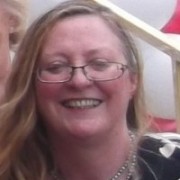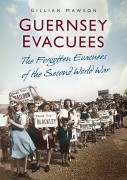How Guernsey Evacuees Changed My Life
In May 2008 I was an administrator at the University of Manchester and also a part time history student. One day whilst working in a Manchester archive, I discovered that over 17,000 Guernsey evacuees had arrived in England in June 1940, just before the Nazis invaded their island. I was totally astounded! I knew that the Channel Islands had been occupied but had no idea that almost half the population had come to mainland Britain. I was equally amazed that the majority had been sent to English towns from which local children had been evacuated 9 months earlier.
As I began to trace and interview Guernsey evacuees, most said they had never been asked to share their story before. I discovered that the evacuees had integrated into their local wartime communities, but had also formed 100 Channel Island societies to enable them to retain a ‘Guernsey network’. They had contributed to the British war effort by joining the forces, working in ammunition factories and building aircraft. Around 5,000 Guernsey school children had arrived in England with their teachers and some of their schools had been re established in England for the duration of the war.
I also discovered that thousands of young Guernsey mothers had arrived with their infants, whilst their husbands joined the forces or remained in Guernsey to protect their property. These women had left home with practically nothing, and although some had unhappy experiences, the majority described the overwhelming kindness of their English neighbours.
I became so involved in this research, that in late 2010, when a voluntary severance scheme opened at the university, I applied, so that I could spent a full year conducting interviews and sharing my findings with the public through a blog. I also founded a community group for Guernsey evacuees in the Greater Manchester area. This enabled them to meet up, share wartime traumas and to share their stories with the Manchester community at heritage events, and in schools and colleges.
I believe that the fact that I am a mature woman (mid fifties) and a keen listener helped me to connect with these elderly evacuees during our interviews. They shared details of their evacuation with me that were very personal, with some being ‘off the record’. There were frequently tears during interviews, especially when the evacuated mothers, who are now in their late 90s, told me of the kindness they had received from English housewives during the war. Eva Le Page told me ‘I left Guernsey with my baby, and a bag containing feeding bottles and nappies. I will never forget the kindness of my neighbours when I moved into an empty house in Bolton. When they helped you, they did it with good hearts.’
One evacuee informed me that when her Guernsey school reached England, it was financially supported by Americans who each sponsored a child. One of the children, Paulette, was actually sponsored by Eleanor Roosevelt, and I worked with the BBC on a documentary about their friendship and wartime correspondence. I also asked the evacuees about their return to Guernsey in 1945, although not all returned home, as they felt that England could provide them with a better future. Many that did return had difficulty picking up the pieces of their pre war lives, or faced problems as a result of five years of separation from their families. Mothers had difficulty connecting with their husbands after five years apart, and also had to help their children to reconnect with their fathers. In addition some evacuees were labelled as ‘cowards who had run away from the Germans’ by those who had remained during the occupation, which was deeply upsetting.
It became clear to me that this research was not just a contribution to Guernsey’s history, but also a missing part of the story of Britain’s Home Front. I began to talk about the evacuation on BBC radio in Manchester and the Channel Islands, and to write articles for magazines and newspapers. I also set up an online blog which I shared through Twitter and Facebook. My first book ‘Guernsey Evacuees: The Forgotten Evacuees of the Second World War’ was published by History Press in November 2012. During the five years of researching and writing this book, I was also approached by evacuees from different countries with their own stories. I realised that such stories will be lost for ever if they are not collected now and preserved for future generations. I am now putting together another book entitled ‘Evacuees: Personal Stories of Life on the Second World War Home Front’. It will contain around 100 personal evacuee stories from all around Britain, and will be published in September 2014.
My life has been completely transformed from the life of that rather unfulfilled university administrator. With the support of my husband, I now work in an office on a part time basis, so that I have a few days a week to interview as many evacuees as I possibly can, before it is too late. This also gives me the chance to spend time with my community group of evacuees. Clearly, interviewing these amazing people about their evacuation experiences has completely changed the direction of my life.
—
Gillian was born in 1957. In her mid forties she undertook part time study whilst also working full time as an administrator. She gained a BA (Hons) in History followed by an MPhil in Social History. Gillian lives in Derbyshire with her husband and two cats.
Guernsey evacuation blog: guernseyevacuees.wordpress.com/writing-my-book-blog/
Gillian’s family history and local history blog: whaleybridgewriter.blogspot.co.uk
You can follow her on Twitter @guernseyevacuee or visit her on facebook Channel Island Evacuees
Category: British Women Writers, Contemporary Women Writers, On Publishing, On Writing, Women Writing Non-Fiction, Women's Books and Writings
Comments (3)
Trackback URL | Comments RSS Feed
Sites That Link to this Post
- Featuring Women Writers on WWWB 2013 - Women Writers, Women Books | December 31, 2013



























Great story! If you have not already watched it, see Island at War, a three-part series produced in 2004. A very moving, but dark, portrayal of what Channel Islanders endured, if they stayed behind.
This is so beautiful – I really admire you for what you are doing. It’s not easy to condense other people’s stories into a book like this, it’s humble and beautiful and important. 🙂 Thank you for sharing!